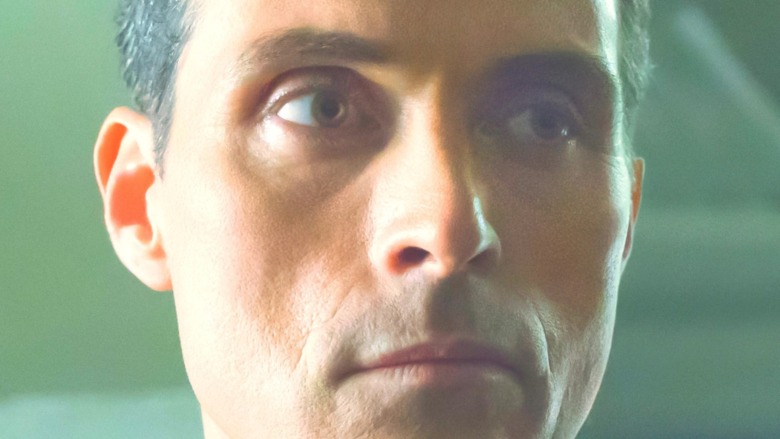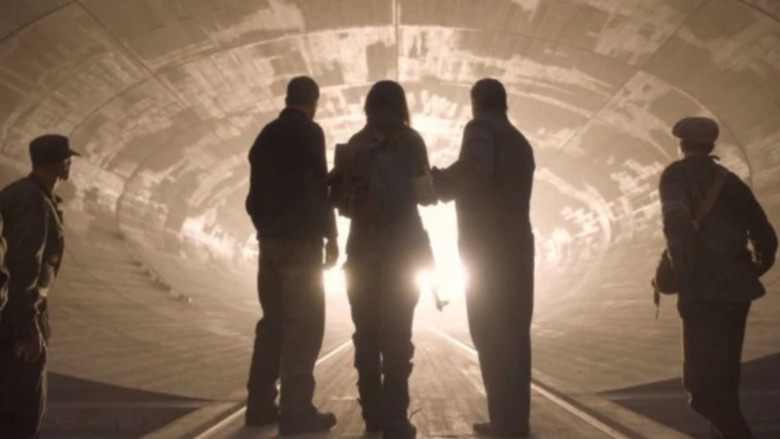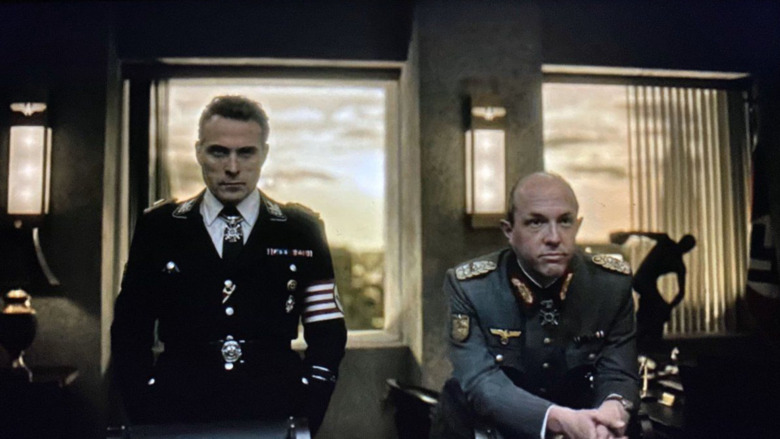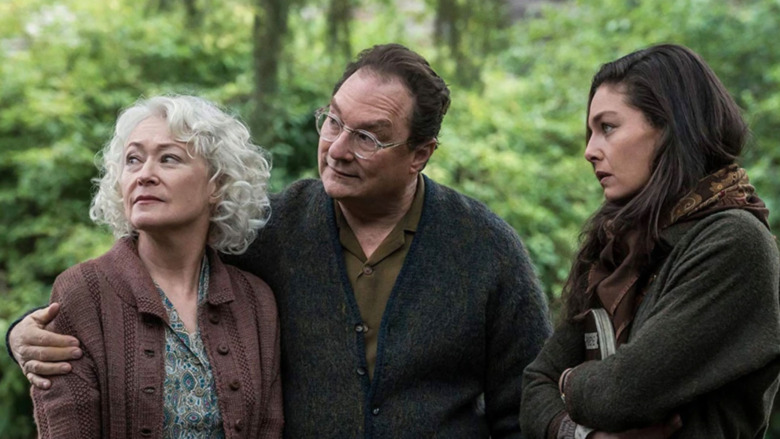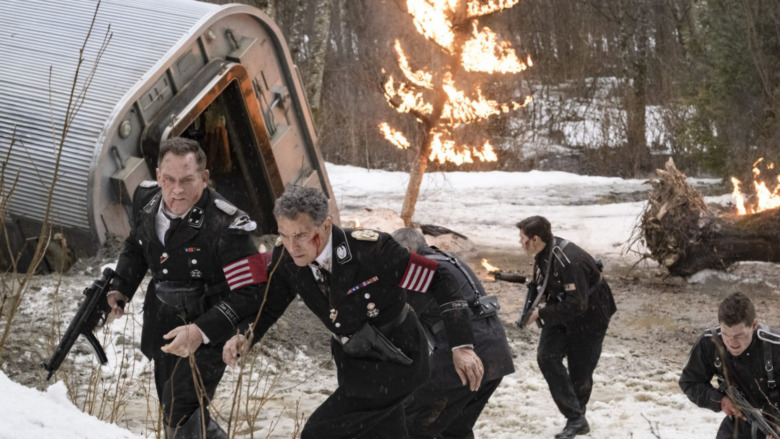The Ending Of Man In The High Castle Explained
Amazon's "The Man in the High Castle" was one of the more controversial shows of the past decade, and it was controversial even before it aired — remember when Amazon had to pull its ads for the show from New York City subways?
But it was also a highly ambitious series. Based on the novel by Philip K. Dick, "The Man in the High Castle" explores an Earth where the Axis powers won World War II, and Nazi Germany and the Empire of Japan occupy large regions of the United States. On top of that disturbing political scenario, there's also a science fiction angle. Eventually, the characters realize they've been living on just one of many Earths spread across multiple realities.
A lot went down over the show's four seasons, and by the time it reached the endpoint it had a lot of threads to tie up. Many critics felt that the finale didn't quite pull that off, as "The Man in the High Castle" ended on an ambiguous note. It might not have provided all the answers, but was a fitting way to end a series that was never going to have a happy ending.
The ending of "The Man in the High Castle" has a lot to unpack, so let's get started.
The multiverse is now open, but what does that mean?
Before delving into the show's final scene, we should note that Season 4 showrunner David Scarpa told Entertainment Weekly that the series finale was deliberately ambiguous. With that in mind, it's plenty to discuss in breaking down the finale.
"The Man in the High Castle" ends with Juliana, Wyatt, and Hawthorne watching a portal to alternate dimensions open, as people from "everywhere" walk through. Earlier in the series, it was established that there are multiple realities, and the only way people can travel between them is if they have already died in the reality they want to travel to (although Juliana is at least one exception). That would imply the people coming through the portal in the finale have already died in this world.
The timing of their return is also significant. They're only able to return after Smith is dead and the threat of widespread genocide in the former United States is over. One of the recurring themes throughout the series is the concept of balance. Trade Representative Tagomi believes that the universe needs to exist in a state of balance to achieve harmony. If that's true, it would mean the reality in which the Axis won World War II has gone way too far in the "evil" direction. Smith's death restores harmony to the world, allowing the dead to return home.
As for the specific reason why they're returning, that's less clear. Are they here to help rebuild this world? Are they here simply because the world where most of the show takes place is the "prime" world, and so everyone considers it "home"? Again, it's open to interpretation.
The America everyone knew is gone forever
"The Man in the High Castle" seems to end on a hopeful note. The man who succeeds Smith, General Bill Whitcroft, throws away his Nazi medals, which would seem to mean that he has no intention of staying loyal to the Third Reich, and may even be planning to break away. It's great that the Nazis are (maybe) gone, but America will probably never return to the way it used to be.
Let's start with the American Reich. Assuming General Whitcroft really does want to restore America, that won't be an easy task. Nazi Germany will most likely have an issue with it, as will the thousands of Americans who participated in the regime and no doubt still support it. But even if America can fend off another Nazi invasion, the country would still have to face a reckoning over the widespread genocide that took place under the American Reich.
America's prospects aren't much better in the Japanese Pacific States. Yes, the Empire of Japan does abandon the region. But now, the political entity most likely to fill the vacuum is the Black Communist Rebellion. This is a Black resistance group that has in the past wanted to overthrow the Japanese, but not to restore the American government — the BCR wants to establish an independent state in the Pacific Northwest. It's also a communist organization, obviously, and receives support from China.
After the series finale, it's likely both of the former occupied areas as well as the Neutral Zone would come into some sort of conflict. Whichever side wins out, it won't look anything like the America of yore.
Juliana and Hawthorne get closure, if not happy endings
The opening of the portal between worlds fundamentally changes the game for both Juliana and Hawthorne. In Juliana's case, it means she's served her purpose as the hero of the story. Over the course of the series, Juliana transforms from a compliant subject under Japanese rule to a badass resistance fighter. But the real reason she's the main character is because she has an ability almost no one else does: she can cross between the alternate realities. How the multiple realities actually work is still ambiguous, but one thing is clear: Smith's death has opened the portal and joined the worlds, and now people can cross freely between them. Since there's no more need for a "chosen one" with this special ability, Juliana's journey has come to an end. At least, this particular journey has — the country is still an utter mess.
As for Hawthorne, the titular "Man in the High Castle," his role in the story was to tip off Juliana to the existence of the multiple realities using his films. In classic Heroes' Journey terms, that makes him a "mentor" archetype. Like any good archetypal mentor, Hawthorne gives the main character crucial knowledge and then pays for it severely. In Hawthorne's case, after giving Juliana his films, the American Reich captured him and forced him to make propaganda — for him, a fate worse than death. When Smith dies and the portal opens, Hawthorne is able to cross through the portal to look for his wife Caroline, whom the Nazis killed.
Which raises another question: if the people coming through the portal are the Nazis' victims returning home, why isn't Hawthorne's wife among them? And where does he expect to find her?
At least John Smith didn't get a redemption arc
John Smith seemed ripe for a redemption arc, but as the series drew to a close and Smith took over the American Reich, he proved powerless to change anything about it.
Smith's redemption never came. Part of the reason was definitely that he's committed too many sins to truly be redeemable — he's already carried out genocide and plans to do so again. But the bigger reason has to do with why he switched sides in the first place: to protect his family.
The show never quite answers the question of whether Smith sincerely believes Nazi ideology, but his initial reason for switching sides was to create a safe life for his wife, Helen, and their son, Thomas. By the end of the series, Smith's family is irrevocably broken. Thomas is dead. Helen has seen the error of her family's ways and given Smith up to the resistance, sacrificing her own life in the process. She's also already smuggled their daughters, Jennifer and Amy, to the Neutral Zone. The happy family unit Smith once knew is gone, if it ever existed in the first place.
Whether Smith was an opportunist or a true believer is almost irrelevant. He became a Nazi to protect his family, and in doing so destroyed his family. Without his primary motivation in life, it's understandable why Smith let the Resistance finish him off.
Scarpa wasn't kidding when he said the show would have an ambiguous ending, but regardless of the many unanswered questions and uncertain futures for the characters, "The Man in the High Castle" remained a chilling exploration of fascism and its fallout, right up to the end.
